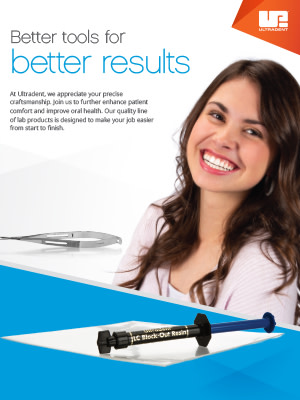Free Standard Shipping on All Orders $285+
Instructions for Use (IFU)
Safety Data Sheets (SDS)
Product Allergens
See any common allergens this product may contain >>Price breaks are offered on most items...
This amount is an estimate based on retail price. The actual amount due (shown at the final stages of your order) may be different from what is displayed here.
Return Policy
Items returned within 30 days of purchase with a return authorization number on the outside and inside of the return box will be credited 100%. Product returned between 31 and 60 days from purchase date is subject to a 20% restocking fee. Ultradent will not accept returns after 60 days. Errors in shipment must be reported within 14 days of invoice date. All return authorization numbers become invalid 90 days after date of issue. A return authorization number must accompany all returns to receive proper credit. Please contact Customer Service at 800.552.5512 for assistance.
Limited Warranty
Sof-Tray Classic Sheets are specifically designed to create custom-made whitening trays for patients interested in take-home whitening treatments.
- Available in Regular, Medium, and Heavy thicknesses
- Select Regular (0.035") for most whitening trays
- Select Medium (0.060") for bruxers’ whitening trays
- Select Heavy (0.080") for severe bruxers' whitening trays
Technical Details
The Right Thickness for Any Patient
Sof-Tray Classic Sheets come in three different thicknesses, so you can find the one just right for any patient. Most patients will require the Regular size, but if you have patients with TMJ issues or those who grind their teeth but still want to whiten overnight, you can use the Medium sheets or Heavy sheets.
Soft and Flexible
Sof-Tray Classic Sheets are soft and flexible, which means they’re easy to trim using the Ultradent™ Utility Vinyl Cutters and the Ultradent™ Ultra-Trim Scalloping Scissors. And they’re extremely comfortable for the patient!
Ideal for Use with the UltraVac™ Vacuum Former
Sof-Tray Classic Sheets fit perfectly in the UltraVac Vacuum Former. The heating element of the UltraVac efficiently heats the Sof-Tray material to the ideal softness, and the vacuum element effectively forms the heated material precisely around the stone model.
Clinicals
Forming to the Mold

Procedures
Tray Fabrication Step by Step
See Instructions for Use for complete instructions, warnings, and precautions.
Step 1
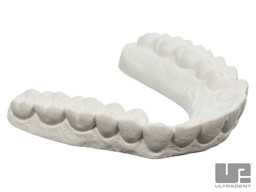
Pour impression with fast-set plaster or dental stone. Pour alginate shortly after making impression to ensure accuracy. Trimming is less work if quantity of stone is kept to a minimum. Palate and tongue areas are not poured or should be removed after plaster has set. Allow model to dry two hours.
Step 2
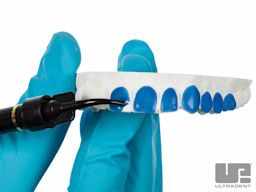
For reservoir spaces, apply Ultradent™ LC Block-Out resin approximately 0.5 mm thick onto labial surfaces and approximately 1.5 mm shy of the gingival margin. DO NOT extend onto incisal edges or occlusal surfaces. Using a VALO™ curing light, cure each tooth 5 seconds. Wipe off oxygen inhibition layer.
Step 3
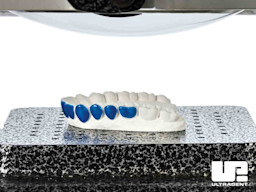
With a vacuum former, heat tray material (Sof-Tray™ Classic Sheets) until it sags approximately ¼" to ½" for the 0.035" material and 1" for the thicker material (0.060" and 0.080"). Adapt plastic over model. Cool and remove model from the vacuum former. Cut excess bulk of material away with serrated plastic trimmers (e.g. Ultradent™ Utility Cutters).
Step 4
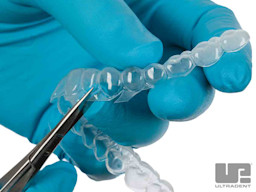
With small tactile scissors (e.g. Ultradent™ Ultra-Trim Scalloping Scissors), carefully and precisely trim the tray to the clear line which is at the gingival height. Scallop edges to avoid contact with gingival tissue.
Step 5
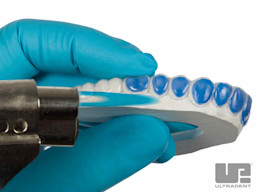
Return tray to model; check tray extensions. Gently flame polish the edges one quadrant at a time, if necessary, with a butane torch. While still warm, immediately hold periphery of each segment firmly against model for three seconds with water-moistened gloved finger. If this over-thins the tray material, fabricate a new tray.
Step 6
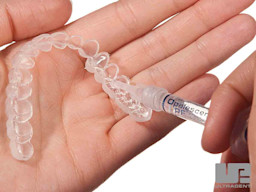
Review enclosed instructions with patient to brush teeth and explain the process of loading the tray by expressing one continuous bead of gel approximately halfway up from the incisal edge on the facial side of the tray from molar to molar. Explain that this should use about 1/2 to 1/3 of a syringe.
Step 7
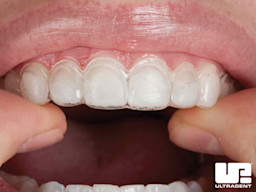
Place tray over teeth. Gently press tray to move gel into place. Pressing too firmly will force gel out of tray.
Step 8
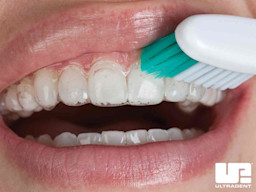
Remove excess gel with a soft toothbrush.
Step 9
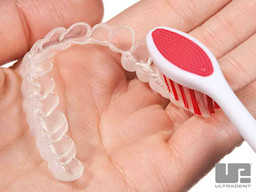
Clean tray with soft toothbrush and water. Remind patient to follow the whitening regimen you have established.
Note: See Instructions for Use for complete instructions, warnings, and precautions.
Frequently Asked Questions
-
How many Sof-Tray Classic Sheets come in a pack?
Sof-Tray Regular Sheets come in packs of 25 sheets. The Medium and Heavy sheets come in packs of 20 sheets.
-
How long do I have to wait for the tray material to cool before trimming?
It’s best to allow the tray to fully cool before removing it from the vacuum former. Otherwise, you will likely distort the tray and have to start the process over.
-
Is there a specific way I should place the Sof-Tray sheets in the UltraVac vacuum former?
Yes. It’s best to place the sheet in the vacuum former with the faint lines in the tray material parallel with the front of the vacuum former.
-
How long do I heat the Sof-Tray Classic sheets?
The duration of time will vary depending on your equipment and the thickness of the material, but look for the sagging or drooping shown in the Clinical image above (approximately ¼" to ½" for the 0.035" material and 1" for the thicker material (0.060" and 0.080").

